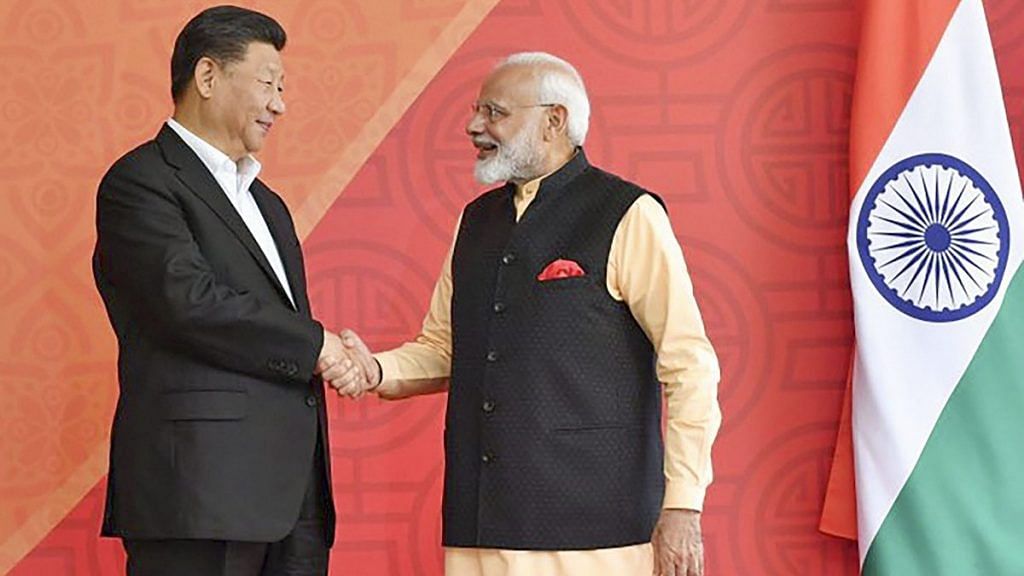As the global death toll from the coronavirus continues to mount – 166,000 by 20 April evening, of which more than 40,000 deaths are in the US alone – alongside a US lawsuit demanding $20 trillion in compensation and a German daily slapping a €150 billion bill on Beijing, China has mounted an aggressive defence, saying that it moved fast to contain the virus at the expense of its own citizens so as to give the world time to protect itself.
Much stronger reactions are also being heard.
In the Global Times, a newspaper run by the Chinese Communist Party like most media in China, a journalist with China Central Television, Li Jiaming, published an evocative piece titled ‘Every move to stigmatize China evokes our historical memory’. He accused the Western world of “shamelessly” passing the buck. He also retold the 13th century story of the ‘Wolf of Zhongshan’ who eats up the person who saves him.
Also read: China is feeling the heat over Covid-19 — from Japan to Australia. But India’s hands are full
China, the aggrieved party
There is little left to the imagination here. The Western world, led by US President Donald Trump, who has threatened that China will face the consequences of allowing Covid to become a pandemic, is the big bad wolf, while the poor Chinese people are its victims.
Li goes on to evoke another historical comparison, which is that in the Chinese calendar, the year 2020 is the “Year of Gengzi,” which occurs every 60 years and that two cycles ago, in 1900, the Eight-Nation Alliance (led by Britain, along with the US, France, Tsarist Russia, Japan, Germany, Italy and the Austro-Hungarian empire) crushed the Boxer rebellion by looting, burning and “invading China”.
“Now, 120 years later,” Li adds, “the descendants of some of the Eight Nation Alliance shamelessly demand compensation, they evoke our historical memory of humiliation…If they want to get even with China, let us start from the damage China suffered since the First Opium War in 1840.”
Also read: Can China be brought before an international court over Covid pandemic? Yes
From ‘bhai-bhai’ to cautious ties
Truth is, in the post-Jawaharlal Nehru era, most developing countries have fallen for the same Chinese rhetoric. Certainly, China feels very strongly about the historical injustice done to it and this evokes equally strong sentiments in nations with similar historical experiences, for example in India. The “Hindi-Chini bhai-bhai” slogan is a manifestation of that affection. Later in the mid-1960s, India, allegedly, supported the move for a permanent seat in the UN Security Council for the People’s Republic, rather than breakaway Taiwan, because it is the true representative of the Chinese people.
Fast forward the decades to the present, via the India-China border problem, Pakistan, Masood Azhar and Kashmir, and a lot seems to have changed. At the same time, the India-China economic relationship has also grown by leaps and bounds, with the basket of goods significantly favouring China.
Former foreign secretary and China expert Shyam Saran described the bilateral relationship as “adversarial,” but pointed out that it didn’t mean India could become a cheerleader for the US in finger-pointing, blame-gaming or scapegoating China over the coronavirus pandemic.
“You cannot blame China if the virus originated in that country or jumped species from bat to human in that country, but you can certainly blame it for holding back that information for a few weeks, which might have made the world of a difference in controlling the pandemic at an early stage,” Saran said.
Also read: In China, two ‘subjects’ questioned ‘emperor’ Xi and they disappeared from public view
Silence is a statement
Another Chinese expert who spoke on the condition of anonymity said the Narendra Modi government’s response of keeping very quiet, unlike the US, is the right one, because at this time India needs thousands of masks, protective gear, ventilators, etc. to deal with the Covid outbreak and all that can only come from China.
India’s ambassador to China Vikram Misri has gone on record saying that he has its hands full, focusing on dealing with the current crisis.
“The India-China relationship is far too complex for India to say anything publicly right now. It’s better that we allow other nations to show their teeth,” the aforementioned expert said, referring to the US as well as France, whose president Emmanuel Macron recently said that it was “naïve” to think China had handled the pandemic properly.
That is why India’s decision to amend its foreign investment policy, which calls for much greater scrutiny of all investments from neighbouring countries – referring to China – has led to a sharp reaction from the Chinese embassy in Delhi, which has labeled it “discriminatory.”
“Xin li you gui,” said a third China expert in Mandarin — “to have a guilty conscience.” China’s aggressive defence of the coronavirus pandemic is “failing abysmally,” this expert added, pointing out that cooperation, not confrontation, was the only way to put the genie back into the bottle.
Views are personal.
